|
|
Class I
|
Class II
|
|
Summary
|
McCord * (1945-49) D
Browning * (1949-53) D
Clement (1953-59) D
Ellington (1959-63) D
Clement (1963-67) D
Ellington (1967-71) D
Dunn (1971-75) R
Blanton (1975-79) D
Alexander (1979-87) R
McWherter (1987-95) D
Sundquist (1995-2003) R
Bredesen (2003-2011) D
Haslam (2011-2019 ) R
Lee (2019- ) R
|
McKellar * (1917-53) D
Gore Sr. * (1953-71) D
Brock * (1971-77) R
Sasser * (1977-95) D
Frist (1995-2007) R
Corker (2007-19) R
Blackburn (2019- ) R
* defeated for re-election
** died in office
*** resigned to become Vice President
|
Stewart * (1943-49) D
Kefauver ** (1949-63) D
Walters (1964) D
Bass * (1965-67) D
Baker (1967-1985) R
Gore Jr. *** (1985-93)
Mathews (1993-1995) D
Thompson (1995-2003) R
Alexander (2003- ) R
|
Until 1953, Tennessee governors are elected to two-year terms and allowed to run for re-election twice (six consecutive years possible). They can run again after sitting out one term.
The state Senate elects a speaker, who is first in the line of succession to be governor and uses the title Lieutenant Governor.
Tennessee doesn't have a primary run-off law, making it possible to be nominated with less than a majority of the votes.
|
1946
|
Jim McCord, a Crump candidate, is elected to a second two-year term.
|
Sen. Kenneth McKellar, Democrat and dean of the U.S. Senate, is re-elected to his sixth term, having served continuously since Tennessee began direct election of U.S. senators in 1916.
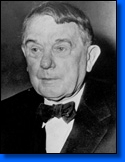
McKellar, a Crump crony, is president pro tem of the Senate and third in the line of succession to the presidency. Once a New Deal Democrat, Crump has grown crusty and conservative in his old age.
|
Sen. Tom Stewart, hand-picked by Ed 'Boss' Crump of Memphis in 1942, looks ahead to his re-election campaign. Crump, also known as 'The Red Snapper', rules statewide with a crafty combination of unholy alliances, racial intimidation and demagoguery.
|
In a precursor to 1948, World War II veterans battle Boss Crump's cronies with guns and dynamite to prevent ballot box stuffing on election night in McMinn County. It would become known as the "Battle of Athens".
|

1948
|
Former Gov. Gordon Browning, repositioned as an anti-Boss Crump candidate, rides Kefauver's coattails from the Senate race to defeat McCord. In the General Election, Browning trounces Republican Roy Acuff, the country music performer.
|
Congressman Estes Kefauver leads the defeat of the Crump political machine in the Democratic Primary. Crump commits the fatal error of abandoning Stewart in favor of Cookeville Judge John A. Mitchell, thereby splitting the old-guard vote. In the General Election, Kefauver handily defeats Republican nominee Congressman B. Carroll Reece.
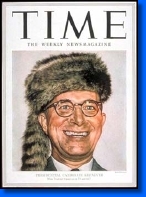
Crump accuses Kefauver of being a "pet coon" to Communists. Kefauver replies, "I may be a pet coon, but I'm not Mr. Crump's pet coon" and adopts a coonskin cap as a campaign symbol.
Kefauver's victory in 1948 begins an 18-year period in which the old Tennessee political order crumbles, concluding with Howard Baker's win in 1966.
1950 Kefauver chairs a Senate committee that investigates organized crime, making him a national figure and earning the enmity of President Truman.
1952 Kefauver runs for president. His early success causes Truman to forgo a re-election bid. Kefauver wins nearly all the primaries, but Adlai Stevenson is nominated by the Democratic convention.
|
|
1950
|
Browning defeats progressive Clifford Allen in the Democratic Primary and Republican John R. Neal in the General Election.
|
|

1952
|
Browning loses the Democratic Primary to populist Frank Clement, who came to prominence as executive director of the state Public Service Commission.
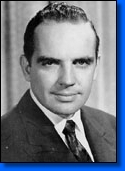
Clement has nominal backing of vengeful Boss Crump, but Crump's influence is waning. Clement wins largely as a new generation candidate after World War II.
Allen runs again and draws a large bloc of votes from the left wing of the party, hurting Browning.
This is the final two-year term for governor. It's also, as recently as 2014, the last time that a sitting governor was defeated for re-election.
|
Congressman Albert Gore Sr. defeats 85-year-old McKellar, a steadfast ally of Boss Crump, in the Democratic Primary, further crippling the Crump machine.
McKellar's campaign signs read, "Thinkin' Feller, Vote McKellar." Gore's campaign posts signs next to them reading, "Think Some More, And Vote For Gore."
Gore easily wins the General Election over Republican nominee Hobart Atkins.
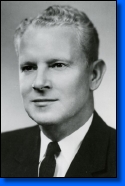
|
1953 Voters OK a constitutional amendment changing the governor's term to four years but preventing successive terms. Clement can run for a four-year term in 1954, which he does.
|
1954
|
Browning runs again, but Clement easily wins the primary and General Election for the state's first four-year gubernatorial term.
1956 Northerners bring violence to school desegregation in Clinton, and Clement becomes the first Southern governor to activate the National Guard in support of school integration.
1956 Clement delivers the Keynote Address at the Democratic National Convention; his famous "How long, oh Lord?" speech is soars to oratorical heights.
|
Kefauver rolls nominal primary and General Election opposition.
1956 Kefauver runs for president and withdraws before the convention. Presidential nominee Adlai Stevenson leaves the choice of a vice presidential candidate to the convention, which elects Kefauver; 2nd place: Sen. John F. Kennedy; 3rd place: Gore Sr.
Eisenhower and Nixon are re-elected.
|
|

1956
|
Boss Crump dies.
1955 Former U.S. Secretary of State Cordell Hull, who won the Nobel Peace Prize in 1945, dies. Hull was previously a Tennessee legislator, state judge, congressman and U.S. Senator.
|
1958
|
Unable to succeed himself, Clement taps Buford Ellington, his agriculture commissioner and former campaign manager. Ellington wins by a plurality in a closely fought primary. Allen again finishes third with a big bloc of votes.
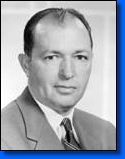
Ellington wins the General Election against a nominal Republican and a big field of independents, including former Gov. McCord, who finishes in second place.
|
Gore defeats former Gov. Prentice Cooper for the nomination and Hobart Atkins, again, in the General Election.
|
State House impeaches Criminal Court Judge Raulston Schoolfield of Chattanooga for malfeasance. Senate convicts, and Schoolfield is removed.
|
1960
|
Kefauver breezes to re-election, despite a shamefully racist campaign against him in the primary.
1963 Kefauver dies after a heart attack on the Senate floor.
Herbert S. "Hub" Walters, a Clement mentor and Democratic stalwart, is appointed by the governor to serve until the next election and doesn't run in the 1964 special election.
1964 Midway through his term as governor, Clement runs for the two years remaining in Kefauver's Senate term. Democrats rebuff him by nominating Congressman Ross Bass, a Kefauver protege, who defeats Republican newcomer Howard Baker Jr. in the General Election. Bass serves for two years.
|
|
1962
|
Clement wins the Democratic Primary with a plurality against two strong candidates.
In the General Election, Independent Thomas R. Anderson -- a progressive Democrat hoping to defeat the Democratic establishment with Republican support -- finishes ahead of Republican nominee Hubert D. Patty.
|
Republican U.S. Rep. Jimmy Quillen first elected to Congress from Upper East Tennessee. He would serve a record 34 years.
1963 Baker v. Carr, a Tennessee case before the U.S. Supreme Court, leads to "one person, one vote" apportionment principle and Tennessee's first redistricting of the Legislature since 1901, a further breakdown in the old political order.
|
1964
|
Gore wins the Democratic nomination against token opposition and beats Republican Dan Kuykendall in the General Election by a healthy margin.
|
|

1966
|
Ellington returns and defeats political newcomer John Jay Hooker in the Democratic Primary. Hooker is a silver-tongued, charismatic candidate who will be a factor in state politics for decades to come. The Republicans don't even nominate anyone.
The 1952-1970 period will become known as the Clement-Ellington leapfrog years.
|
In a rematch of 1964, Clement turns the table and defeats Bass for the Democratic nomination for a full six-year term.
Baker, easily nominated again, defeats Clement in the General Election to become the state's first popularly elected Republican senator and the first Republican senator since Reconstruction.

Baker is steeped in politics. His father and stepmother each represented the 2nd District in Congress, and he is the son-in-law of U.S. Senate Republican Leader Everett Dirksen of Illinois.
Baker's victory gives Republicans their first major foothold in statewide Tennessee politics in modern times and ushers in statewide two-party competition.
Baker completes the process begun by Estes Kefauver in 1948. Baker's 1966 victory retires the old political order that Kefauver first cracked and begins regular two-party statewide competition.
|
State Rep. Ray Blanton defeats Tom Murray, another old-guard Democrat, in the primary and goes to Congress. It's the last time until 2008 that an incumbent Congressman loses in the primary • Dorothy Brown, D, becomes the first black woman elected to the Legislature.
1967 The General Assembly begins annual sessions. Though Democratic, as it has been since Reconstruction ended in 1870, the Legislature shows stirrings of independence from the Executive Branch in a series of minor encounters.
|
1968
|
1969 With a virtual tie for partisan control of the state House, a Democratic defection helps elect Republican Bill Jenkins to be speaker, the first GOP speaker since Reconstruction • Frank Clement dies in a traffic accident while planning a 1970 bid for governor.
|

1970
|
Memphis dentist Winfield Dunn, a political neophyte, wins the Republican nomination.
Hooker wins the Democratic nomination in a crowded field and despite Ellington's strenuous efforts. Hooker alienates conservative Democrats with his liberal tendencies and is also hobbled by allegations of business misdeeds.
Dunn wins the governor's mansion -- the first Republican governor in exactly 50 years. His lone term is marked by testy relations with the Democratic Legislature and alienation of the Republican rank-and-file in several regions.
|
Gore wins the Democratic nomination in a bruising fight against Ellington ally Hudley Crockett. Republican nominee Congressman Bill Brock bashes Gore on the Vietnam War and prayer in school.
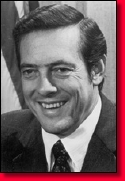
The Watergate scandal a few years later reveals that Tennessee in 1970 was a Nixonian testing ground for what would become known as Dirty Tricks in 1972
Gore loses.
|
Republicans win control of the state's congressional delegation.
John Wilder, D-Somerville, is elected by the state Senate to be Lieutenant Governor, a post he will hold continuously until 2007. Democrats regain control of the state House and elect Nashvillian Jim McKinney speaker. Arrogant, bombastic and wildly partisan, McKinney alienates nearly everybody. Legislative independence flourishes against a Republican governor.
|
1972
|
Baker waxes Democratic nominee Blanton as part of the nationwide Nixon landslide. Blanton's appeal to backers of racist George Wallace flops.
1973 Baker gains national prominence as ranking Republican on the Senate Watergate Committee. Lawrenceburg lawyer Fred Thompson is the committee's minority counsel.
1976 Baker nearly selected as President Ford's running mate, but Sen. Bob Dole gets the prize.
1977 Baker elected Minority Leader by the Senate Republican Caucus.
|
Tennessee House delegation in Congress falls by one (to eight) after 1970 census.
Bob Clement, son of the late governor, is elected to represent East Tennessee on the Public Service Commission in his first try for elected office. Third-term Rep. Ned McWherter of Dresden defeats McKinney by one vote in the House Democratic Caucus and assumes the speakership, a post he will hold for a record 14 years until elected governor.
1973 Comptroller William Snodgrass stitches together a coalition of Republicans and dissident Democrats in the joint legislative session after the Democratic caucus nominates Floyd Kephart.
|
1974
|
Blanton wins a crowded Democratic Primary with 23 percent of the vote. Political newcomer Lamar Alexander wins the Republican nomination but has no hope in the Watergate landslide three months after Nixon's resignation.
Blanton's term is marred from the beginning by partisanship, arrogance and scandal; it ends early in a palace coup after the 1978 election.
FBI's TennPar investigation nabs several of the governor's aides, and Blanton later serves time in federal prison for malfeasance.
|
In the 3rd Congressional District, Democratic nominee Mort Lloyd dies in a plane crash. Democrats nominate his wife, Marilyn, who defeats incumbent Republican Lamar Baker • Democrats regain control of the congressional delegation in the Watergate landslide • Harold Ford Sr., D-Memphis becomes the South's only black congressman -- and Tennessee's first -- by defeating Rep. Dan Kuykendall, R. This is the last time until 2008 that a Tennessee congressman loses a re-election bid.
Anna Belle Clement O'Brien, sister, confidante and former aide of the former Governor, elected to the Legislature, where she'll serve for 16 years.
1975 Clifford Allen wins a seat in Congress to fill a mid-term vacancy representing Nashville.
|

1976
|
State Democratic Party chairman Jim Sasser wins the nomination in a crowded primary; Hooker finishes second.

Wealthy Brock has problems because of a blind trust that "has one eye open," in Sasser's words, and for paying little federal income tax a few years earlier -- legally but with a high political price.
Democrats, angry over Gore's loss in 1970, tar Brock with the now-disgraced Nixon. Hooker exhorts crowds to "send Bill Brock to San Clemente and let him sit at his master's feet."
Riding Jimmy Carter's coattails, Sasser ousts Brock.
|
Al Gore Jr. elected to Congress from the same district once represented by his father. • United Nations General Assembly convenes in Nashville • State Sen. Fred Berry, R-Knoxville, commits suicide after losing his re-election bid in the primary.
1977 Carr retires as secretary of state • Brock elected chairman of the Republican National Committee.
|

1978
|
In another crowded primary, the Democrats' nominate flashy Knoxville banker Jake Butcher, who has lots of money and little political sense. In second place is Bob Clement, son of the late governor.
Meanwhile, Republican Alexander is walking across the state. Exploiting Butcher's slickness and voter remorse over Blanton, Alexander walks to victory.

In January 1979, to thwart a last-minute spate of bribery-inspired pardons by Blanton, Democratic leaders back a plan to use a loophole in the state Constitution and swear Alexander into office several days early. Lt. Gov. Wilder calls it "impeachment, Tennessee style." It works; Blanton is out. At Alexander's order, the Highway Patrol seizes control of the Capitol.
|
Baker wins re-election in another landslide, this time against Nashville Democrat Jane Eskind.
1980 Baker runs for president and loses early in the nominating process
1981 Baker becomes Senate Majority Leader after the Republicans take control of the Senate in the 1980 Reagan landslide.
|
Voters approve a constitutional amendment allowing governors to serve two consecutive four-year terms, but Blanton wisely doesn't try.
State Senate votes, 18-14, to remove Appellate Court Judge Charles Galbreath for outrageous conduct, including a laudatory letter to Hustler magazine on court stationery, but not by the necessary two-thirds majority.
Congressman Clifford Allen dies in office.
|
1980
|
The state House expels, 92-1, Rep. Bob Fisher, R-Elizabethton, after he's convicted on state bribery charges related to legislative service.
Eskind wins a seat on the Public Service Commission, making her the first woman and the first person of Jewish heritage elected to statewide political office.
1981 State Rep. Emmett Ford, D-Memphis and brother to Harold Sr., resigns after being convicted of insurance fraud unrelated to his legislative service.
|
1982
|
Alexander mows down Knoxville Mayor Randy Tyree, a protege of Butcher, to become the first governor re-elected to a four-year term.
In second place for the Democratic nomination is state Sen. Anna Belle Clement O'Brien, sister of the late governor and aunt to Bob.
Alexander's first term is mostly a feel-good, do-nothing event, but his second term is marked by a major education initiative, tax increases and a huge highway construction program. Alexander also attracts major economic development, but his administration loses control of the state prison system.
|
Sasser wins the Democratic nomination with no opposition and rolls over Republican Congressman Robin Beard in the General Election. Sasser emphasizes economic issues and benefits from an anti-Reagan trend in the mid-term elections. Beard never gets traction.
Overwhelming victories by Democrat Sasser and Republican Alexander on the same day illustrate the size of the persuadable vote in Tennessee's political center.
|
Tennessee House delegation in Congress up by one (to nine) after 1980 census.
Bob Clement runs for Congress (7th District) and loses to Republican Don Sundquist of Memphis.
Jim Cooper, son of former Gov. Prentice Cooper, elected to Congress (4th District), defeating Cissy Baker, daughter of the Republican senator.
1983 State Sen. Ed Gillock, D-Memphis, resigns after being convicted of influence-peddling charges • Butcher's banking empire collapses; he later goes to prison.
|
1984
|
Baker doesn't seek re-election. Gore Jr. snares the Democratic nomination without opposition and trounces state Sen. Victor Ashe of Knoxville, the Republican nominee.

Gore carries all nine congressional districts in his first statewide race.
1988 Gore Jr. runs for president and loses early in the nominating process.
|
A rural district overwhelmingly renominates and re-elects State Rep. Tommy Burnett, D-Jamestown, while he sits in a federal prison for income tax misdemeanors unrelated to his legislative service. He'll be out of prison by the time the Legislature convenes in January.
|

1986
|
House Speaker McWherter wins the Democratic nomination over Eskind and thwarts a comeback bid by former Gov. Dunn to win the General Election.
All of Eskind's campaigns are primarily financed by personal wealth, which she spends freely. Campaign buttons urge, "Make Her Spend It All, Ned".
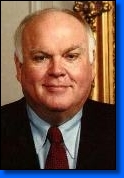
McWherter promises a 95-county economic development program, which he subsequently delivers.
Dunn, haunted by political skeletons from his 1971-75 term, falls way short.
|
1987 A bipartisan coalition re-elects Wilder lieutenant governor after the Senate Democratic Caucus nominates Riley Darnell.• Ed Murray, McWherter's hand-picked successor, elected speaker of the House • Bob Clement wins election for an unexpired term to represent Nashville (5th District) in Congress, his first victory since 1972 • Ford Sr. indicted on charges stemming from the failure of the Butcher banks; acquitted in 1993.
|
1988
|
Sasser whips a token Republican opponent.
|
U.S. Rep. John Duncan, R-Knoxville, bequeaths his seat to son Jimmy Duncan.
1989 FBI's Rocky Top investigation sends Burnett back to prison and out of the Legislature. Secretary of State Gentry Crowell (D) commits suicide after being linked to the investigation. • State House Committee Chairman Ted Ray Miller, D-Knoxville, commits suicide after being arrested in a bribery sting.
|
1990
|
McWherter, riding an eight-year tide of popularity, demolishes a nominal Republican opponent. Highlights of McWherter's two terms: education and prison reform, rewrite of the state criminal code and strong economic growth. Easily electable to any position in the state, he retires after two terms as governor.
|
Gore re-elected in a cakewalk over an unknown opponent.
1992 Gore elected Vice President and resigns from the Senate.
Democratic stalwart Harlan Matthews is appointed by McWherter to the unexpired term and doesn't run in 1994.
1994 Lawyer/Actor Thompson, a Baker protege, defeats Democratic Congressman Cooper for the final two years of Gore's Senate term.
|
1991 Rep. Jimmy Naifeh, D-Covington, a McWherter protege, elected speaker of the state House. • Alexander appointed Secretary of Education by President Bush.
|
1992
|
1993 Alexander exits his cabinet job with the change in presidential administrations.
|

1994
|
Congressman Don Sundquist of Memphis gets the Republican nomination without serious opposition, and a bitter Democratic Primary nominates Phil Bredesen, mayor of Nashville, for governor.
Tennessee Republicans, including Sundquist, surf to victory on a nationwide GOP wave.

|
Sasser is easily renominated and initially looks invincible against Republican nominee Bill Frist, a wealthy political neophyte and Nashville transplant surgeon. But the incumbent's increasing focus on national affairs makes him seem out of touch with his constituents. Frist capitalizes on a national Republican trend and upsets the three-term senator.

Hooker, now a gadfly, runs as an independent and doesn't draw many votes but vents a lot of rhetoric on Sasser to Frist's benefit.
|
Republicans regain majority of congressional delegation. Democrats keep control of both houses of Legislature.
Brock runs for U.S. Senate in Maryland, wins Republican nomination and loses General Election.
1995 Legislature abolishes Public Service Commission, a breeding ground for mischief and Democratic wannabes • Two state Senate Democrats switch parties and briefly give Republicans a majority; practical effect is nil • Frank Clement Jr., brother of Bob, elected as a Circuit Judge.
|
1996
|
Thompson re-elected for a full term without serious opposition.
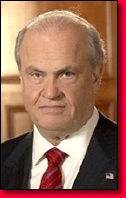
|
Tennessee celebrates 200 years of statehood.
Quillen retires after a record 34 years in Congress.
Harold Ford Sr. bequeaths his congressional seat to Harold Ford Jr.
Democrats regain absolute control of state Senate, and Wilder's still lieutenant governor.
Supreme Court Justice Penny White is ambushed by Republicans and loses her seat in a yes-no election.
Sasser appointed ambassador to China.
Alexander runs for president, loses early in the nominating process and immediately aims at 2000.
|
1998
|
Sundquist breezes to re-election against Democratic nominee John Jay Hooker, a venerable warhorse and present-day gadfly.
Sundquist bases his second term on a quest for major state tax reform, first eschewing and later endorsing a state income tax, though it didn't pass.
While given credit for good intentions on tax reform, Sundquist is generally credited with a lackluster administration and poor management of state government.
|
State Sen. Tommy Burks, D-Monterey, murdered by his opponent while seeking re-election. Burks' widow defeats the assassin with a write-in campaign.
Snodgrass, esteemed State Comptroller (auditor) since 1955, retires.
1999 Alexander ends his six-year quest for president • Sasser resigns as Chinese ambassador • Gore Sr. dies.
|
2000
|
Frist easily defeats token Democratic nominee Jeff Clark.
2002 Frist earns acclaim leading his party to election victories and control of the Senate again.
The unexpected implosion of Senate Republican Leader Trent Lott leads to Frist's election as Republican Leader, effective in 2003.
Frist reaches the pinnacle of Senate power in eight years. Howard Baker, by contrast, took 10 years to become Republican Leader plus another four before the GOP had a Senate majority.
Ironically, Frist defeated Sasser (in 1994) as the Democrat was on the cusp of becoming Majority Leader (after 18 years in the Senate).
As Republican leader, Frist's inexperience and his tin ear on ethics hamper his effectiveness.
Frist keeps his two-term pledge and doesn't run for re-election. His hope of running for president is dashed after his lackluster performance as Republican Leader causes his party to lose control of the Senate in the 2006 elections.
|
Gore Jr. nominated for president by the Democrats, wins nationwide popular vote but loses in Electoral College. He doesn't carry his home state.
Ford Jr. delivers forgettable Keynote Address to the Democratic convention.
2001 Baker appointed ambassador to Japan.
|

2002
|
Bredesen returns to easily snare the Democratic nomination and then edge Republican Congressman Van Hilleary in the General Election.

Bredesen's campaign emphasizes managerial competence in the wake of Sundquist's inept administration. He fares well in typically Republican East Tennessee and becomes the first mayor in state history to be elected governor.
Hilleary runs a negative campaign with overtones of bigotry, hardly proposing an affirmative plan of action.
Bredesen's first term focuses on saving TennCare, the state's substitute for Medicaid. He terms his centrist management of state government "a third way".
|
Thompson surprises everyone with a last-minute announcement that he won't seek re-election; Alexander handily defeats Clement in the General Election.
Alexander, who hadn't won an election in 20 years, earns the Republican nomination as a moderate, besting Congressman Ed Bryant, a hard-line conservative.

Clement gives up a safe seat in Congress to grab the Democratic mantle without significant opposition and winds up with no title without "former" by the end of the year.
Alexander is the first person in state history to be popularly elected Governor and U.S. Senator.
2007 Alexander elected chairman of the Senate Republican Conference.
|
Tennessee still has nine seats in the House after 2000 census • Voters approve a state lottery • Cooper rebounds from his 1994 loss to claim the 5th Congressional District seat abandoned by Clement.
Democrat Lincoln Davis' victory in the 4th District (vacated by Hilleary) means Democrats again have a majority of the state's House delegation (5-4).
|
2004
|
Republicans win their first elected majority since 1868 in the state Senate.
2005 With a Republican majority, the state Senate re-elects Democrat Wilder as speaker and, consequently, lieutenant governor, marking 34 straight years. Senate Democrats, who tried to dump Wilder in 1987, join two Republicans to keep him in office.
Naifeh re-elected speaker of the state House, surpassing McWherter's record for longevity in the post • Baker retires as ambassador to Japan • Frank Clement Jr. appointed to state Court of Appeals.
Five present and former legislators indicted in an FBI bribery sting called Tennessee Waltz. Indicted Sen. John Ford, D, resigns; sister Ophelia elected to replace him. Rep. Chris Newton, R-Cleveland, pleads guilty.
|
2006
|
Bredesen barely acknowledges his token Republican opponent, State Sen. Jim Bryson of Franklin, while coasting to re-election.
|
Former Chattanooga Mayor Bob Corker, a moderate Republican, defeats Democratic nominee and Congressman Harold Ford Jr. of Memphis
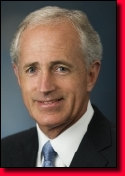
Saddled by race and by his infamous family, Ford outperforms expectations until late in the campaign when a race-baiting ad lets the air out of his balloon.
Ford is the first African-American nominated by either party in Tennessee for statewide office.
Corker defeats conservatives Hilleary and Bryant in a nasty Republican Primary.
|
State Sen. Don McLeary of Jackson switches from D to R in the spring, bolstering the GOP majority to 18-15 • Election irregularities cause state Senate to void Sen. Ophelia Ford's 13-vote 2005 victory, leaving the seat vacant. In November, voters boot McLeary in one district and re-elect Ford in another.
Former Sen. Roscoe Dixon, D-Memphis, convicted on Tennessee Waltz charges. Indicted (Tennessee Waltz) Sen. Kathryn Bowers, D-Memphis, resigns.
Steve Cohen, D-Memphis, becomes Tennessee's first Jewish member of Congress in the race to replace Ford Jr. Cohen benefits from splintering among African American politicians to win in a heavily black district.
2007 Sen. Ron Ramsey, Blountville, becomes the first Republican speaker of the Senate (and lieutenant governor) since Reconstruction, finally reflecting the GOP's 2-year-old control of the body. Ramsey's victory ends the record-busting, 36-year speakership of Wilder.
State Sen. Mike Williams, Maynardville, switches from R to Ind. at mid-session, creating a 16-16-1 tie in the Senate. Ramsey's status unchanged
Former Sens. John Ford, Kathryn Bowers, and Sen. Ward Crutchfield, D-Chattanooga, all guilty of felony bribery (Tennessee Waltz).
Gore Jr. wins Nobel Peace Prize, an Emmy and an Oscar.
Bob Clement runs for mayor of Nashville and loses.
|
2008
|
Alexander handily defeats Democratic stalwart Bob Tuke.
2012 Alexander resigns as chairman of the Senate Republican Conference, saying he wants to work on building bipartisan consensus instead of being a partisan leader. Simultaneously, he announces for re-election in 2014.
|
Republicans win majorities in both houses of the General Assembly for the first time since Reconstruction • Rep. David Davis, R-Johnson City, loses renomination bid, the first incumbent Congressman to lose in Tennessee since 1974 • Wilder retires from the Senate
2009 Faced with a 50-49 Republican majority, Democrats elect GOP Rep. Kent Williams of Elizabethton to be Speaker, thwarting the nominee of the Republican caucus • State Sen. Paul Stanley, R-Memphis, resigns after an intern-sex scandal.
Congressmen Bart Gordon of Murfreesboro and John Tanner of Union City, both Democrats, announce retirement.
|
2010
|
Knoxville Mayor Bill Haslam easily defeats political newcomer Mike "Son of Ned" McWherter to replace term-limited Bredesen.

Haslam is the second consecutive mayor elected governor and the first Knoxvillian in more than a century.
|
Wilder dies • Three congressional districts switch from D to R and the GOP takes a 7-2 majority of the House delegation • Rep. Lincoln Davis, D-Pall Mall, is the first incumbent congressman to lose a general election since Lamar Baker and Dan Kuykendall in 1974.
2011 Rep. Beth Harwell of Nashville becomes the first female Speaker of the Tennessee House as Republicans take unambiguous control.
|
2012
|
Corker re-elected easily.
2015 Corker becomes chairman of the Senate Foreign Relations Committee
2017 Corker broadly hints he won't run for re-election, but no one takes him seriously. Then everyone acts shocked when he announces it.
U.S. Rep. Marsha Blackburn, R and Trump supporter, immediately jumps into the race.
The unexpected twist comes when former Gov. Phil Bredesen announces he'll seek the Democratic nod, setting up a barn burner for 2018.
|
|
2014
|
Haslam, a moderate, easily re-elected.
Haslam's two terms are characterized by above-average state performance in a growing economy, no scandals and major new resources for education.
|
Alexander sidles to another victory.
2015 Alexander becomes chairman of the Senate Health, Education, Labor and Pensions Committee
2018 Alexander announces he won't run for re-election.
|
State Sen. Ophelia Ford loses in the primary, ending 40 years of at least one member of Memphis' Ford family in the Legislature.
|
2016
|
Lt. Gov. Ron Ramsey, who led Republicans to control of the State Senate after more than a century as the minority, retires.
Long-time legislator Randy McNally of Oak Ridge elected Senate Speaker and, consequently, Lt. Governor.
Rep. Jerry Durham expelled from the state House of Representatives for "disorderly behavior" after a wave of allegations of sexual harassment and other misconduct.
2017 Durham fined $455,000 for campaign finance violations
|
2018

|
Haslam is term-limited. Former Nashville Mayor Karl Dean is the Democratic nominee. Political neophyte Bill Lee wins the GOP nod and the General Election.

|
Blackburn rides a solid pro-Trump vote to become the first female U.S. Senator from Tennessee.

|
|
2020
|
|
|
2022
|
|
|
|



